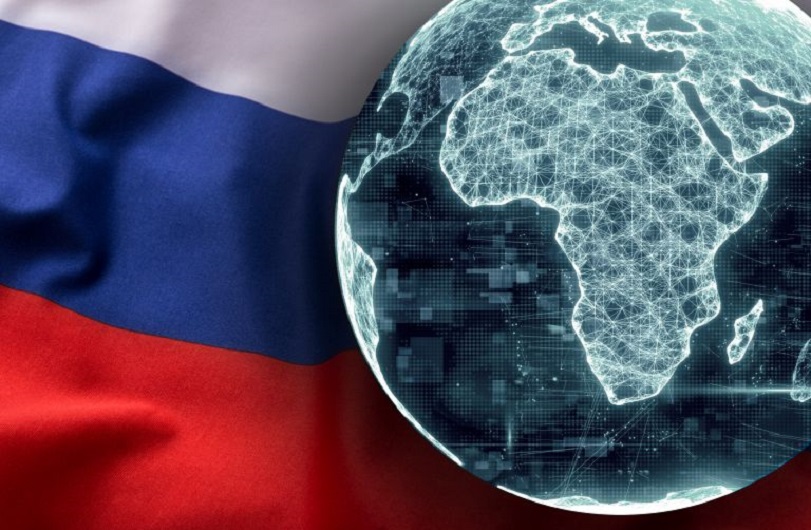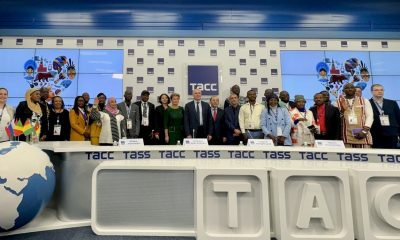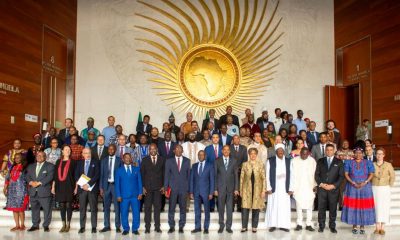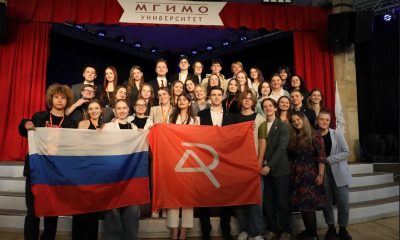Economy
Russia-Africa Summit: One More Opportunity for Raising Trade Collaboration

By Professor Maurice Okoli
Russia holds an African leaders’ gathering this late July 27-28 in St. Petersburg, the second largest city in the Russian Federation. The summit is the highest historical profile and the largest-scale diplomatic landmark event in Russia’s bilateral relations with Africa. In our assessment of the emerging multipolar world, the majority of African states are swiftly aligning their policy orientation toward China and Russia.
Russian Ambassador-at-Large and Director of the Secretariat of the Russia-Africa Partnership Forum Oleg Ozerov, in an interview with Kommersant daily newspaper, explicitly explained that the summit is “envisioned by the Russian authorities, are intended to boost Moscow’s relations with African countries, contacts with which are currently deemed one of the most important aspects of Russia’s foreign policy.”
According to the diplomat, the summit will focus on general issues “concerning the formation of a multipolar world, a new fair architecture of relations based on the principles of sovereign equality of states, equal interaction based on their interests and international law, as opposed to the so-called ‘rules-based order’ promoted by Washington and its allies.”
Given that it is taking place during this tense global situation, it broadly aims at bringing about a fundamentally new level of beneficial partnership to meet the challenges of the 21st century. By this, Russia and Africa will open the second chapter, which defines the comprehensive cooperation between Russia and African nations across significant sectors ranging from politics, security, economic relations, science and technology to cultural and humanitarian spheres.
The first Russia-Africa summit was held in October 2019 under the Peace, Security and Development motto in Sochi. Russian President Vladimir Putin noted in an official statement: “Today, African countries are well on their way towards social, economic, scientific and technological development, and are playing a significant role in international affairs. They are strengthening mutually beneficial integration processes within the African Union and other regional and sub-regional organizations across the continent.”
Even though Russia is currently undertaking a ‘special military operation’ in neighbouring Ukraine, it still considers it necessary to invite African leaders to St. Petersburg. It is the original home of Vladimir Putin and indeed wanted to welcome Africans for a homecoming-friendly meeting for deliberations. Russia and Africa are bonded by history from the political independence struggle. Both share this little history. As widely known, Putin always expresses the highest affection for changing the situation and commitment to improving conditions for Africa’s estimated 1.4 billion population.
With the highest respect, he consistently reminds us that Russian-African relations are based on long-standing traditions of friendship and solidarity, created when the Soviet Union supported the struggle of African peoples against colonialism, racism and apartheid, protected their independence and sovereignty, and helped establish statehood and build the foundations of national economies.
In the views of many policy experts, both local and foreign, African leaders, trade organizations and corporate business executives have an extraordinary opportunity to design a well-timed strategy to take advantage of the growing market and to boost trade as a way to reverse considerably trade imbalance that has existed from Soviet days between Russia and Africa.
Within the global changes, there are equally good business perspectives for Russia and Africa, for instance, with trade facilitation and support for business enterprises, either small or medium, to seek cooperation in areas of new trade opportunities both in Africa and in the Russian Federation. For example, external countries have been showing massive interest in taking advantage of its emerging opportunities since the inception of the Africa Continental Free Trade Agreement (AfCFTA), which aims to create a single borderless market.
With steadily developing economic links, it’s a pleasure to underline that Russia and African states have a long history of relations. Therefore, importing coffee, cocoa, tea, citrus, sea products and many more from African countries could be important for Russia. Of course, it is necessary to recall from the first summit that both parties have mutually agreed to promote and raise export/import and to cooperate in investment spheres with Russian companies.
In light of Russia’s sanctions – the ban on imports of many types of European agricultural products – diversification of sources of such raw materials has become especially crucial, while import substitution in the country is only fledging. This presents an opportunity for strengthening trade with Asia and Africa. In the views of many, several African countries, such as Morocco, Kenya, and South Africa, have already started filling the niche; Russian market shelves are enjoying a surge in African vegetables and fruits, most of which used to be re-exported through the EU.
As far back as 2014, local African farmers and cooperatives expressed readiness to boost direct exports to Russia, bypassing European mediators. African countries can make a fortune by selling agricultural products to Russia. The overall trade volume between Africa and Russia has been deficient and highly skewed in favour of Russia. But interestingly, there are only a few African countries trading products in Russia’s market for multiple reasons, including inadequate knowledge of trade procedures, rules and regulations, and the changing market conditions. And there are many other obstacles hindering African trade with Russia that have been identified and discussed in many business conferences and seminars.
However, concrete measures to improve the situation must be thoughtfully implemented. There are existing key challenges from both sides. Russia and Africa have been experiencing a shortage of vital business information on doing business and the market environment, and this has, over the years, created a condition of uncertainty, misgivings and negative perceptions among prospective potential traders and investors.
As many have shown concern about these trends, one way is to create a mechanism for disseminating business and trade information that will enhance business interaction among African exporters and Russian importers.
In addition, African leaders have to cultivate business interest in organizing trade platforms and business missions to showcase their potential in the Russian Federation. Comparatively, Africa’s exports to the United States, European Union and even to India and China have been growing due to trade preferences, lower custom tariffs and other trade incentives made available to African exporters by these big-time players.
It is necessary to say that the United States offers various incentives through the African Growth and Opportunities Act (AGOA). China has also adopted similar measures to attract African exporters to its regions. In June 2023, Hunan province held its 3rd annual China and Africa Trade Expo and Exhibition.
According to market research and studies conducted by Markol Consultancy, a business research and policy advisory firm, African exporters have keen interests in the Russian market but need help getting their goods delivered on time to consumers in Russia. They know that the market potential is vast in both ways and further understand that Asian countries have comparative advantage trading with Russia regarding distance, transportation of goods and other infrastructure, including logistics and warehousing.
In an effort to boost Russia-African trade, there should be policy interventions, initiate trade platforms for Russians and Africans to participate in practical discussions on making trade policies more effective and offer import and export credit support for corporate traders to achieve noticeable results.
One of the key AfCFTA initiatives focuses on improving SMEs’ access to finance and markets to encourage their growth and contribution to Africa’s socio-economic development. Russia’s institutions can also provide financial services in areas such as agro-processing, automotive, pharmaceuticals, and transport and logistics – to small and medium enterprises (SMEs) in African countries.
Taking a glimpse at the trade volume between China and Africa, both regions have done so much for more than the past 20 years despite all the scepticism and criticism. It is commendable that African countries have made efforts to raise their trade volume dramatically to cut down the trade imbalance, given the Chinese government’s necessary trade incentives and lower customs duties.
As for ways to reverse the huge trade imbalance between Africa and Russia, I would like to make the following suggestion. Russian business people and investors could collaborate in infrastructure, manufacturing, strict quality control and packaging in Africa. China and India are doing these in Ethiopia, for example, and a few other countries.
Foreign Affairs Minister Sergey Lavrov has repeatedly stated in his speech to African diplomats that Russia was prepared to consider new initiatives to improve trade between the two regions. In May 2014, Lavrov wrote in his article: “We attach special significance to deepening trade and investment cooperation with the African States. Russia is ready to provide African countries with extensive preferences in trade.”
Russian Foreign Affairs Ministry has posted an official report on its website that “traditional products from least developed countries (including Africa) would be exempted from import tariffs. The legislation stipulates that the traditional goods are eligible for preferential customs and tariffs treatment.”
That is very understandable. Still, African trade has been minimal in the Russian Federation. And unbelievably, African trade figures with Russia are hard to find from both African and Russian sources. For trade relations between Russia and Africa to improve appreciably, granting trade preferences to African countries – for example, tax exceptions or reductions, among other measures. This can become a practical step to strengthen trade relations with Africa.
In addition, there should also be state support to bolster private African entrepreneurs’ efforts not only to raise their economic presence but also to facilitate making solid inroads into the Russian market. This can be beneficial to the entire Eurasian region. Russia is a member of the newly created Eurasian Economic Union (which constitutes a vast market and allows free movement of goods among member countries). The other members include Armenia, Belarus, Kazakhstan and Kyrgyzstan.
It is worth ending this article by mentioning the role of North-Eastern Federal University, which has educational partnerships and exchange programmes with a number of establishments in Asia and Africa, and the newly established Russian-African Club, a non-profit organization set up to support official efforts in building public opinion, as among the driving forces in the Russian policy of comprehensive partnership with Africa. Ultimately, there is a noticeably growing mutual cooperation between Africa and Russia.
Professor Maurice Okoli is a fellow at the Institute for African Studies and the Institute of World Economy and International Relations, Russian Academy of Sciences. He is also a fellow at the North-Eastern Federal University in Russia
Economy
Champion Breweries Concludes Bullet Brand Portfolio Acquisition

By Aduragbemi Omiyale
The acquisition of the Bullet brand portfolio from Sun Mark has been completed by Champion Breweries Plc, a statement from the company confirms.
This marks a transformative milestone in the organisation’s strategic expansion into a diversified, pan-African beverage platform.
With this development, Champion Breweries now owns the Bullet brand assets, trademarks, formulations, and commercial rights globally through an asset carve-out structure.
The assets are held in a newly incorporated entity in the Netherlands, in which Champion Breweries holds a majority interest, while Vinar N.V., the majority shareholder of Sun Mark, retains a minority stake.
Bullet products are currently distributed in 14 African markets, positioning Champion Breweries to scale beyond Nigeria in the high-growth ready-to-drink (RTD) alcoholic and energy drink segments.
This expansion significantly broadens the brewer’s addressable market and strengthens its revenue base with an established, profitable portfolio that already enjoys strong brand recognition and consumer loyalty across multiple markets.
“The successful completion of our public equity raises, together with the formal close of the Bullet acquisition, marks a defining moment for Champion Breweries.
“The support we received from both existing shareholders and new investors reflects strong confidence in our long-term strategy to build a diversified, high-growth beverage platform with pan-African scale.
“Our focus now is on disciplined execution, integration, and delivering sustained value across markets,” the chairman of Champion Breweries, Mr Imo-Abasi Jacob, stated.
Through this transaction, Champion Breweries is expected to achieve enhanced foreign exchange earnings, expanded distribution leverage across African markets, integrated supply chain efficiencies, portfolio diversification into high‑growth consumer beverage categories, and strengthened presence in the RTD and energy drink segments.
The acquisition accelerates Champion Breweries’ transition from a regional brewing business to a multi-category consumer platform with continental reach.
Bullet Black is Nigeria’s leading ready-to-drink alcoholic beverage, while Bullet Blue has built a strong presence in the energy drink category across several African markets.
Economy
M-KOPA Nigeria Plans Expansion to Edo, Others After N231bn Credit Milestone

By Adedapo Adesanya
Emerging market fintech firm, M-KOPA, has announced plans to deepen its reach in Nigeria to the South South and South East regions, starting with Edo this year, after providing N231 billion in credit to over 1 million customers in the country.
The firm released its first Nigeria-focused Impact Report, which showed that Nigeria is M-KOPA’s fastest-growing market and fastest to reach the milestone.
Since its foray into the Nigerian market in 2019, M-KOPA has been working to dismantle barriers to financial inclusion by providing flexible smartphone financing and digital financial tools that align with how people in the informal economy earn and manage their money.
It operates in six states in the country, including Lagos, Ogun, and Oyo, among others.
The report highlights the company’s contribution to income generation, digital inclusion and economic opportunity for Every Day Earners across the country.
The report showed that M-KOPA has enabled 290,000 first-time smartphone users, while 56 per cent of agents accessed their first income opportunity through the platform.
It showed high income and livelihood gains among its users, with about 77 per cent of customers leveraging smartphones or digital loans obtained through the platform to generate income, indicating that access to financed devices is directly supporting micro-entrepreneurial activity and informal sector productivity.
Furthermore, 75 per cent of users report higher earnings since gaining access to M-KOPA’s services, suggesting measurable improvements in personal revenue streams. On the distribution side, 99 per cent of agents disclose increased earnings, reflecting positive spillover effects across the company’s value chain.
In addition, 81 per cent of long-term customers state that their household expenses have improved, pointing to enhanced financial stability and better consumption smoothing over time.
Speaking on the report, Mr Babajide Duroshola, General Manager, M-KOPA Nigeria, said, “Nigeria represents extraordinary potential, and we’re proud that it has become M-KOPA’s fastest-growing market. Our Impact Report shows that when Every Day Earners gain access to the right digital and financial tools, they use them to create stability and long-term progress for their families. This is about access that unlocks opportunity and sustained prosperity.”
On its expansion plans Nigeria-wide, the M-KOPA helmsman said, “Many of the states we are considering are already similar to the ones we are currently in proximity… So, there is proximity and similarity between these states, and that’s what we are going to do, starting with Edo.”
He noted that as M-KOPA Nigeria continues to expand, the focus remains on ensuring more everyday earners gain access to the digital and financial tools they need to build resilient, prosperous futures in Nigeria’s rapidly digitising economy.
Economy
Tinubu Okays Extension of Ban on Raw Shea Nut Export by One Year

By Aduragbemi Omiyale
The ban on the export of raw shea nuts from Nigeria has been extended by one year by President Bola Tinubu.
A statement from the Special Adviser to the President on Information and Strategy, Mr Bayo Onanuga, on Wednesday disclosed that the ban is now till February 25, 2027.
It was emphasised that this decision underscores the administration’s commitment to advancing industrial development, strengthening domestic value addition, and supporting the objectives of the Renewed Hope Agenda.
The ban aims to deepen processing capacity within Nigeria, enhance livelihoods in shea-producing communities, and promote the growth of Nigerian exports anchored on value-added products, the statement noted.
To further these objectives, President Tinubu has authorised the two Ministers of the Federal Ministry of Industry, Trade and Investment, and the Presidential Food Security Coordination Unit (PFSCU), to coordinate the implementation of a unified, evidence-based national framework that aligns industrialisation, trade, and investment priorities across the shea nut value chain.
He also approved the adoption of an export framework established by the Nigerian Commodity Exchange (NCX) and the withdrawal of all waivers allowing the direct export of raw shea nuts.
The President directed that any excess supply of raw shea nuts should be exported exclusively through the NCX framework, in accordance with the approved guidelines.
Additionally, he directed the Federal Ministry of Finance to provide access to a dedicated NESS Support Window to enable the Federal Ministry of Industry, Trade and Investment to pilot a Livelihood Finance Mechanism to strengthen production and processing capacity.
Shea nuts, the oil-rich fruits from the shea tree common in the Savanna belt of Nigeria, are the raw material for shea butter, renowned for its moisturising, anti-inflammatory, and antioxidant properties. The extracted butter is a principal ingredient in cosmetics for skin and hair, as well as in edible cooking oil. The Federal Government encourages processing shea nuts into butter locally, as butter fetches between 10 and 20 times the price of the raw nuts.
The federal government said it remains committed to policies that promote inclusive growth, local manufacturing and position Nigeria as a competitive participant in global agricultural value chains.
-

 Feature/OPED6 years ago
Feature/OPED6 years agoDavos was Different this year
-
Travel/Tourism10 years ago
Lagos Seals Western Lodge Hotel In Ikorodu
-

 Showbiz3 years ago
Showbiz3 years agoEstranged Lover Releases Videos of Empress Njamah Bathing
-

 Banking8 years ago
Banking8 years agoSort Codes of GTBank Branches in Nigeria
-

 Economy3 years ago
Economy3 years agoSubsidy Removal: CNG at N130 Per Litre Cheaper Than Petrol—IPMAN
-

 Banking3 years ago
Banking3 years agoSort Codes of UBA Branches in Nigeria
-

 Banking3 years ago
Banking3 years agoFirst Bank Announces Planned Downtime
-

 Sports3 years ago
Sports3 years agoHighest Paid Nigerian Footballer – How Much Do Nigerian Footballers Earn
























